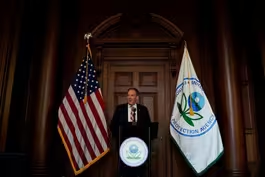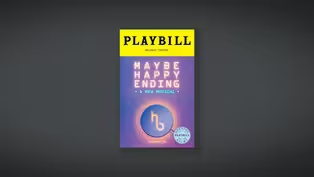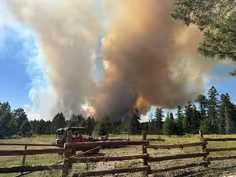
FCC commissioner says Trump's actions threaten press freedom
Clip: 7/29/2025 | 8m 17sVideo has Closed Captions
Trump's 'censorship and control' campaign threatens press freedom, FCC commissioner says
The $8 billion merger between Paramount and Skydance is fueling a fierce First Amendment fight and raising questions about the influence of the Trump administration. The FCC approved the deal by a 2-1 vote along party lines and came shortly after Paramount paid $16 million to settle a lawsuit brought by Trump. Anna Gomez was the sole dissenting vote and joined Geoff Bennett to discuss more.
Problems playing video? | Closed Captioning Feedback
Problems playing video? | Closed Captioning Feedback
Major corporate funding for the PBS News Hour is provided by BDO, BNSF, Consumer Cellular, American Cruise Lines, and Raymond James. Funding for the PBS NewsHour Weekend is provided by...

FCC commissioner says Trump's actions threaten press freedom
Clip: 7/29/2025 | 8m 17sVideo has Closed Captions
The $8 billion merger between Paramount and Skydance is fueling a fierce First Amendment fight and raising questions about the influence of the Trump administration. The FCC approved the deal by a 2-1 vote along party lines and came shortly after Paramount paid $16 million to settle a lawsuit brought by Trump. Anna Gomez was the sole dissenting vote and joined Geoff Bennett to discuss more.
Problems playing video? | Closed Captioning Feedback
How to Watch PBS News Hour
PBS News Hour is available to stream on pbs.org and the free PBS App, available on iPhone, Apple TV, Android TV, Android smartphones, Amazon Fire TV, Amazon Fire Tablet, Roku, Samsung Smart TV, and Vizio.
Providing Support for PBS.org
Learn Moreabout PBS online sponsorshipGEOFF BENNETT: The $8 billion merger between Paramount, CBS' parent company, and Hollywood studio Skydance is fueling a fierce First Amendment fight and raising sharp questions about the influence of the Trump administration.
The FCC approved the deal last week by a vote of 2-1 along party lines.
The vote came shortly after Paramount paid $16 million to settle a lawsuit brought by President Donald Trump over a "60 Minutes" interview with then-Vice President Kamala Harris.
FCC Commissioner Anna Gomez, the sole dissenting vote, issued a blistering statement, calling it an act of -- quote -- "cowardly capitulation that could set a dangerous precedent, reshaping the future of entertainment, while eroding the freedom of the press."
And Commissioner Gomez joins us now.
Thanks for being here.
ANNA GOMEZ, Commissioner, Federal Communications Commission: Thank you for having me.
GEOFF BENNETT: I want to talk more about the First Amendment threats you see resulting from this deal in a moment, but first the timeline, because you noted that the FCC approved the merger only after Paramount agreed to the $16 million settlement.
They made concessions like scrapping DEI policies at Paramount, installing a so-called bias monitor at CBS.
How do you view the connection between the settlement and the concessions and the FCC's approval?
ANNA GOMEZ: So I see this as just another part of this administration's campaign of censorship and control.
Here's what we know.
The president pressured Paramount over the "60 Minutes" segment.
The FCC pressured CBS over the "60 Minutes" segment.
And it wasn't until we saw both the settlement of the president's lawsuit and also the concessions that you mentioned to eliminate all diversity, equity, and inclusion policies and to install a medium monitor that will basically self-censor CBS' content, that this deal was approved.
That is a dangerous precedent.
GEOFF BENNETT: So in your view, how does the government's role in this case cross the line into threatening press freedom?
What are the specific aspects that trouble you?
ANNA GOMEZ: A few things trouble me.
One, first of all, is the fact that the FCC revived a complaint against CBS because of the "60 Minutes" segment.
And it did so after the expert staff had found that there was, in fact, no basis in the facts or the law for a complaint against CBS.
Just to remind you, of course, this involved an interview with Kamala Harris in which CBS showed a different clip of her answer in one program and another clip in a different program.
And this somehow blew up into news distortion.
All they did was cut her answer for brevity, basically.
And that is very standard, as you know, in the news business.
So just reviving this complaint was a pressure campaign against CBS.
And then that became the basis of this lawsuit that Trump had against CBS.
And so what you saw was this pressure campaign that led to concessions.
And that concession of the media monitor is really serious, because what they're saying is that they are going to self-censor basically for ideological purity according to what this administration likes and to report only in the way this administration likes.
Apparently, bias is anything this administration doesn't like.
And that is what they're promising not to show anymore to their consumers.
GEOFF BENNETT: So, in practice, if a program like "60 Minutes" produces a hard-hitting investigative piece on the Trump administration, what happens next under this new framework?
Would that content, would that piece need to be cleared in advance or would this so-called bias monitor act in a role similar to what newspapers have, a public editor who holds a newsroom accountable and answers reader questions, that sort of thing?
ANNA GOMEZ: You know, that's a very good question.
What we know is that this monitor will report directly to the president and will field complaints about the news and about other issues with the programming.
So how that's going to work isn't entirely clear.
And the other thing that's not entirely clear is how this gets enforced by the FCC.
The First Amendment prohibits the government from censoring broadcasters.
That is entirely what the freedom of press is all about.
And so if a complaint comes to the FCC, and the FCC determines that the content needs to be further censored, it's directly violating both the First Amendment and the Communications Act, which prohibits us from censoring broadcasters.
GEOFF BENNETT: Well, the FCC chairman, Brendan Carr, he said in a statement in defense of this approval, he said: "Americans no longer trust the legacy national news media to report fully, accurately and fairly.
It's time for a change.
That is why I welcome Skydance's commitment to ensure that the new company's programming embodies a diversity of viewpoints from across the political and ideological spectrum."
What's the danger there?
ANNA GOMEZ: First of all, let's keep in mind that this administration has been the one that has been sowing distrust in the media for the last decade.
And so to use this alleged distrust in the media as the reason why the FCC needs to step in and regulate is, I think, disingenuous.
So, again, the First Amendment protects from government interference in freedom of speech and the freedom of the press.
We cannot tell the press how to report, how to make its editorial judgments in its news organization, and we should not.
GEOFF BENNETT: You have emphasized that you have a good working relationship with Chairman Carr, a candid and good working relationship.
How does that dynamic affect how you raise dissent within the agency?
ANNA GOMEZ: The chairman and I do work very well together.
I'm a very transparent and very direct person.
He and I have very good conversations.
He knows when I have concerns because I raise them with him, and I also know where he's coming from because he talks about them with me.
So our day-to-day working relationship is good, but I am not going to stop raising concerns when I see these violations by this entire administration against the freedom of speech and the freedom of the press.
GEOFF BENNETT: So, if this merger is part of a broader assault on the First Amendment, as you say, what remedies exist?
What can the public do?
Within your role, what additional proactive steps are you taking to defend press freedom and the FCC's independence?
ANNA GOMEZ: I think it's very important that we all speak up and push back, because the way to address a bully is to push back on a bully.
But it's also very important that we encourage people to understand where our freedoms are being violated or assaulted, as you mentioned, because capitulation breeds capitulation, but courage breeds courage.
We need all institutions, all corporations, all users, all viewers, all listeners to stand up and push back.
GEOFF BENNETT: Are there specific pending or potential FCC proceedings where you're particularly concerned about similar ideological pressure, as you see it, or levers being used in the future?
ANNA GOMEZ: What's happening is, this administration is weaponizing the FCC as a licensing authority.
So any time that we have a license request or a transaction, another merger, the sale of a particular station, I am concerned that you are going to see similar demands for concessions that will lead to censorship.
Self-censorship, whether it's pressured or imposed by the government, is in and of itself a violation of the First Amendment.
And I'm concerned that this will breed more corporate capitulation, because the bottom dollar is what these corporations want.
They are not protecting their journalists.
GEOFF BENNETT: On that point, given the historical parallels between media regulation and authoritarian control in other countries aimed at whether it's silencing dissent or shaping public opinion, do you see signs of something similar happening in this country?
ANNA GOMEZ: I think we really need to protect our freedoms.
We can't let this become the new normal.
And a large part of that, like I said, is to speak up and to push back.
GEOFF BENNETT: FCC Commissioner Anna Gomez, thanks so much for being here.
We appreciate it.
ANNA GOMEZ: Thank you.
GEOFF BENNETT: And a note: We reached out to Chairman Carr's office to request an interview.
We plan to speak with him later this week.
EPA to overturn finding used to regulate carbon emissions
Video has Closed Captions
Clip: 7/29/2025 | 7m 49s | EPA plans to overturn scientific finding used to regulate carbon emissions (7m 49s)
Gaza seeing 'worst case' famine scenario, aid group warns
Video has Closed Captions
Clip: 7/29/2025 | 4m 52s | Gaza experiencing 'worst case' scenario of famine, leading aid group warns (4m 52s)
'Maybe Happy Ending' musical captivates Broadway audiences
Video has Closed Captions
Clip: 7/29/2025 | 7m 3s | 'Maybe Happy Ending' actor and composer on the musical that's captivating Broadway (7m 3s)
News Wrap: Gunman was targeting NFL, New York mayor says
Video has Closed Captions
Clip: 7/29/2025 | 5m 28s | News Wrap: Gunman was targeting NFL, New York mayor says (5m 28s)
Two senators on working across the aisle to combat wildfires
Video has Closed Captions
Clip: 7/29/2025 | 11m 14s | Senators highlight importance of working across the aisle in mission to fight wildfires (11m 14s)
Why 'manosphere' content is appealing to some young men
Video has Closed Captions
Clip: 7/29/2025 | 7m 53s | Why 'manosphere' content is appealing to some young men (7m 53s)
Providing Support for PBS.org
Learn Moreabout PBS online sponsorshipSupport for PBS provided by:
Major corporate funding for the PBS News Hour is provided by BDO, BNSF, Consumer Cellular, American Cruise Lines, and Raymond James. Funding for the PBS NewsHour Weekend is provided by...

















